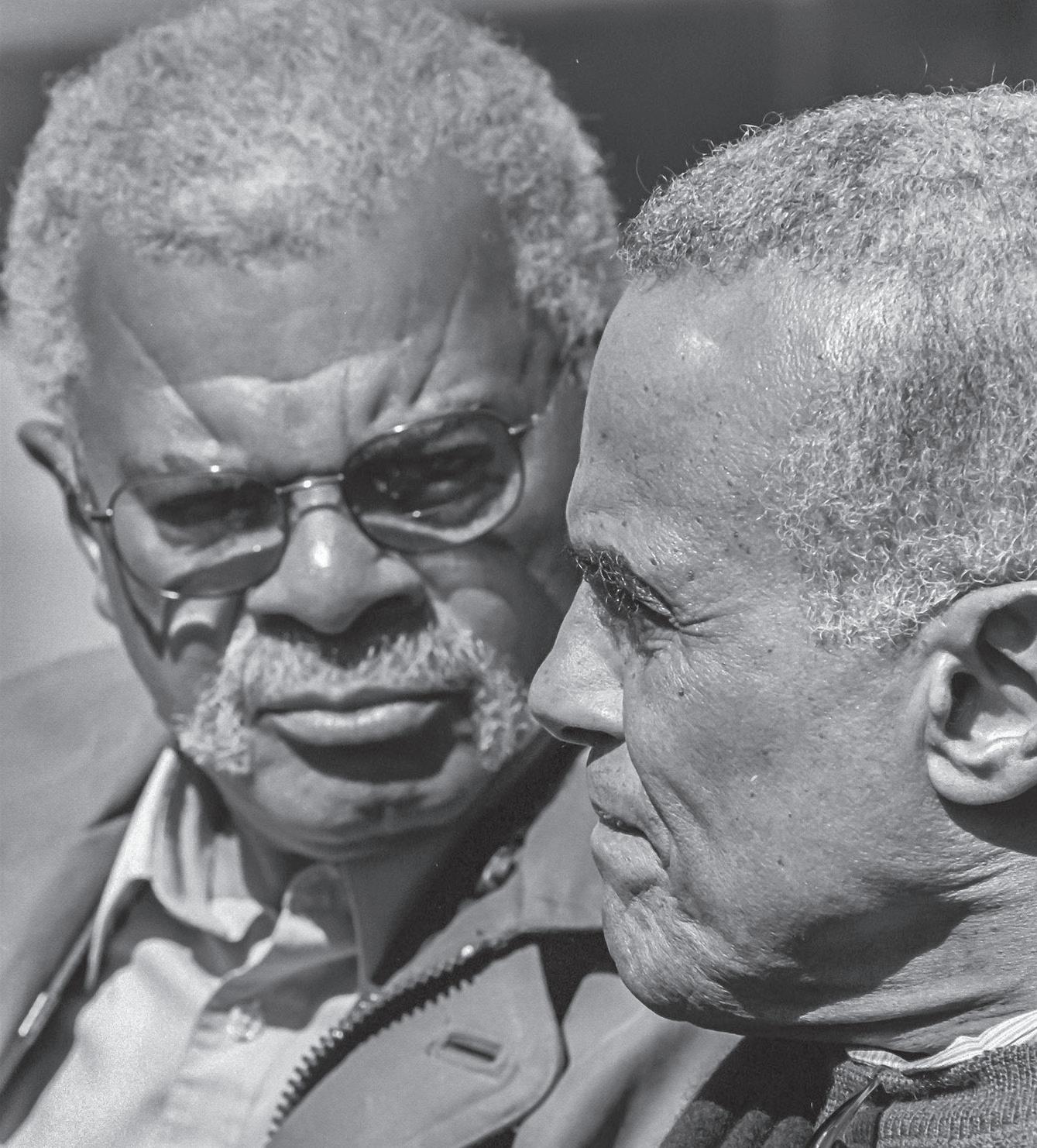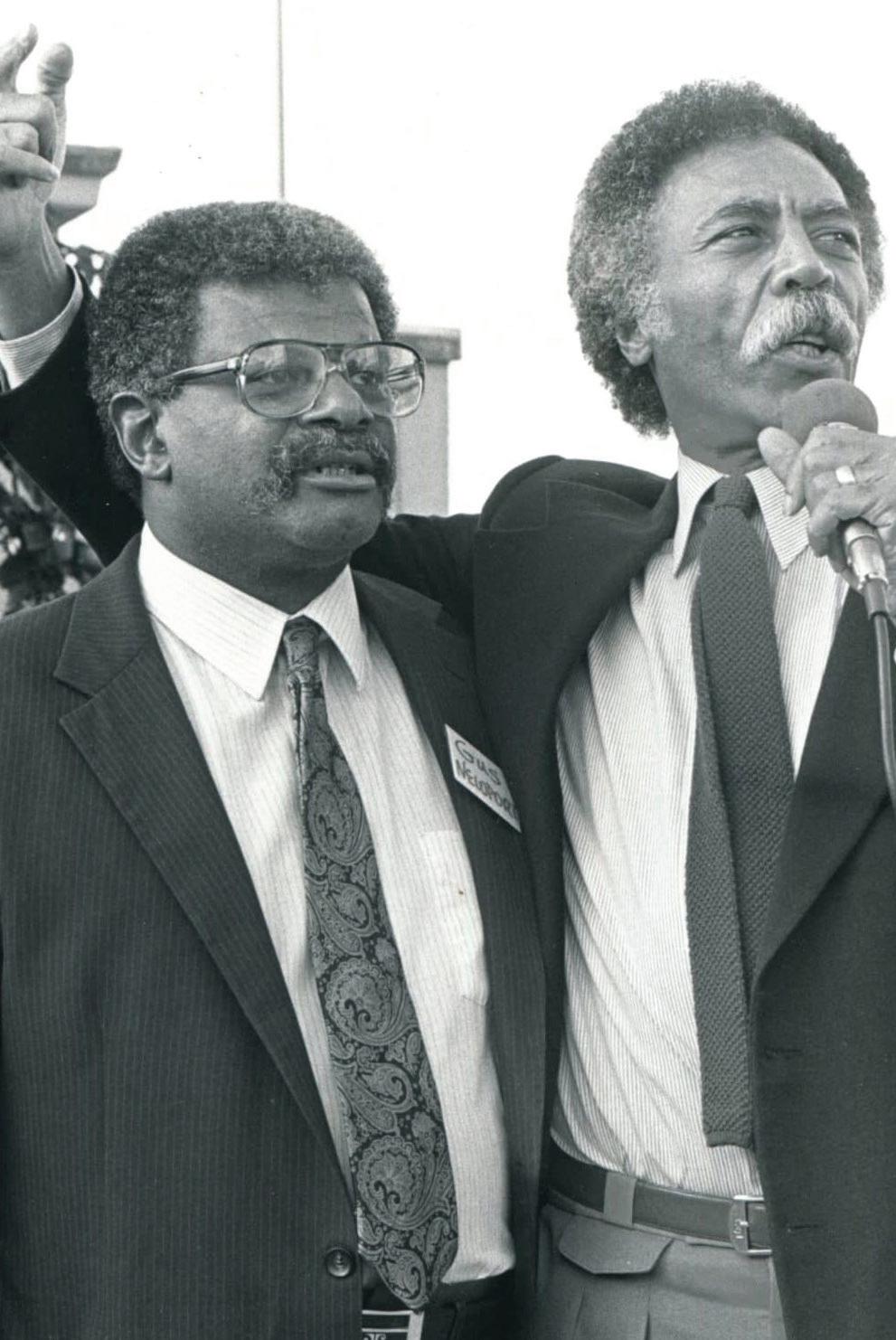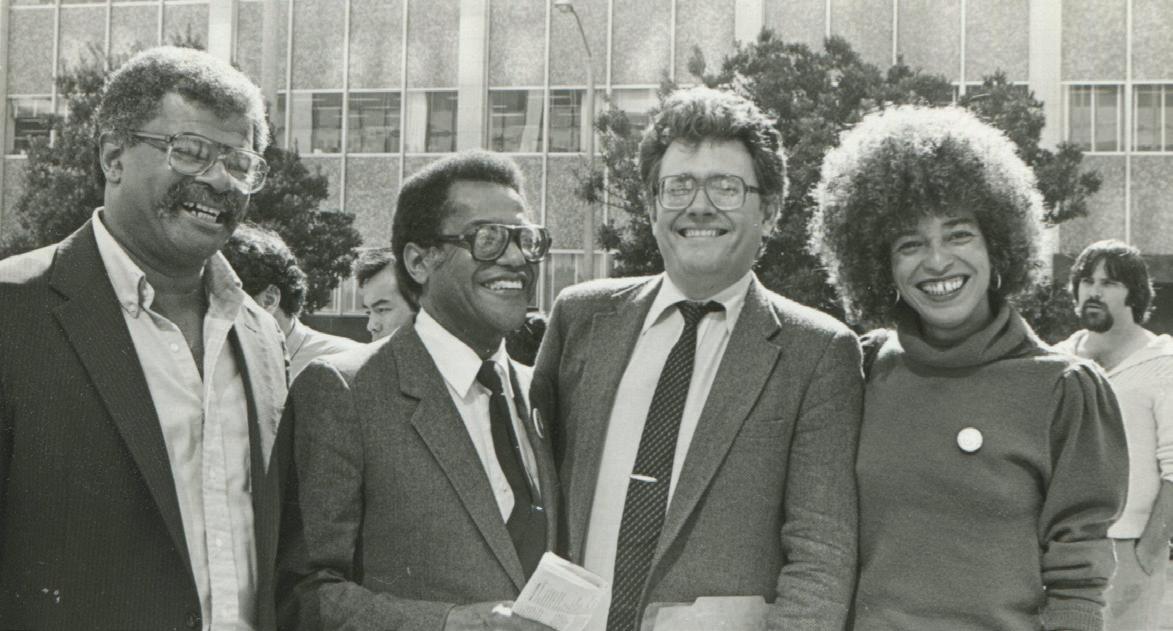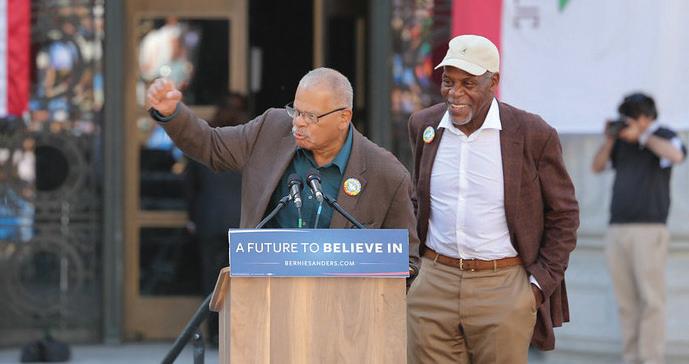
10 minute read
Gus Newport, Local and International Luminary for Civil and Human Rights, 88
Upon learning of his death, Damien Durr, president of the Gus Newport Project, a group dedicated to preserving his legacy, released a statement praising him as, among other things, a brother, coach, bridge builder and ‘Beloved Community’ architect.
“His commitment to seeing the humanity in all people challenged anyone who knew and loved him to do likewise,” the statement read. “He was truly a gift to us, and the world will never be the same because of his stellar example of living his outer life from the inner sanctuary.”
He was a seemingly unstoppable force for 60 years of service in almost countless places finding inspiration from his family and giving inspiration to leaders locally and globally.
Newport was among those who supported U.S. Rep. Barbara Lee when she was the lone congressperson to vote against authorizing the Afghanistan War after 9/11.
On Tuesday, she tweeted that she was saddened by Newport’s death, finding in him “a dear friend and a courageous fighter for world peace. “I have known Gus for many years as a brilliant and compassionate human being,” Lee tweeted. “He has spent his life fighting for justice and liberation, and the world is a better place because of him. He is a true friend and an inspiration to us all. May he rest in peace and power.”
Gus was of the generation of activists galvanized by both the practicalities of self-determination espoused by the Black Muslims and the ideals of the modern Civil Rights Movement.
The eldest of five children, Newport was born in Rochester, New York, on April 5, 1935, and raised by his mother, an elevator operator, and his father, a foreman at a meat-packing plant where Gus would also work periodically.
They and his maternal grandmother, who lived with the family, had great influence on the young Gus. Poor in material but rich in faith, the family put great store in the importance of family, community and church, where his mother learned and honed organizing skills that Gus absorbed at her knee.
Big for his age, Gus, at 13, was already being harassed by the police, experience that would make the issue of police brutality and wrongfulness by authorities in general a theme of his life.
He had a football scholarship to Syracuse University, but couldn’t go because of an injury so he went to Heidelberg College instead. He was drafted in the army in 1958 but was honorably discharged a couple of years later after standing up for the German workers at a base near Heidelberg who were being cheated out of their pay.
He had married his high school sweetheart and together they had a son, Kyle. He took a test that led him to a job with IBM where he was transferred to work on mainframe computers in White Plains, N.Y. He had been there for three years when the Rochester riots of 1964 broke out.
The city manager, aware of
Newport’s talent to work with youth, asked him to help negotiate with the protesters, which he did successfully, setting up a food stamp program and landing a promise to provide 250 college scholarships to needy youth.
His employers at IBM were not happy about his intervention and Gus quit, returning to Rochester in 1966, eventually taking on a job as consultant for the Department of Labor for Puerto Rico and the U.S. Virgin Islands.
Newport was in his late 20s when he led his hometown’s largest civil rights group, the Monroe County Nonpartisan League, to victory taking a police brutality case to the Supreme Court, a first.
The NAACP organizer who led the Little Rock 9 in integrating Central High School, Daisy Bates, was in Rochester and introduced Newport to Malcolm X by phone.
Newport then assisted Malcolm in defending a group of Black Muslims in Rochester who had been assaulted and arrested by police at a worship service.
He also helped Malcolm found his Organization of Afro American Unity (OAAU) and went to Harlem at Malcolm’s request when Malcolm wanted to give a speech about his house being firebombed in February 1965. Four days later Malcolm X was slain.
As reported in the newsletter ‘Common Dream,’ Malcolm, Gus would later say, was “the greatest person I think I ever knew,” a “great teacher” and “one of the dearest friends I ever had.”
Among the luminaries he would befriend over the course of his life were Adam Clayton Powell, New York’s first Black congressman; U.S. Senator Bernie Sanders, actor Danny Glover and Harry Belafonte, the entertainer and fellow activist who passed away just a few weeks ago. The latter two helped with his campaigns for mayor of Berkeley where he edged out his opponent by nearly 900 votes.
At the invitation from a distant cousin, he headed to the West Coast and settled in Berkeley where he got a job developing youth employment programs.
“I never aspired to run for mayor,” he would relate. “I was talked into it by John George, the first African American elected to the Alameda County Board of Supervisors, and Congressman Ron Dellums. Danny Glover (who met Gus while interning with the city of Berkeley) and Harry Belafonte (who he had known in New York) helped with my campaigns,” Common Dream reported.

As its second Black mayor, Newport would keep the city in the national and international spotlight: it became the first city to divest from apartheid-run South Africa and he became an honorary member of Nelson Mandela’s African National Congress and served on the advisory board of the U.N. Commission Against Apartheid.


“By the time Gus was running for his second [mayoral] term, we were both aligned with the anti- apartheid movement,” Glover told The Progressive. “I loved what he was trying to do with community development, so I joined Gus’s army.”
Refugees from war-torn Central
Growing Number of Groups Express Support for Black Reparations...
Continued from page 1 dress historical injustices. tion from the activism of Black leaders like Dr. Martin Luther King Jr., Black Panther Party member Fred Hampton, the Tuskegee Airmen, the Brown Berets, among others. managed to greet him with the sign “Welcome to the Mayor of Berkeley.”
For instance, Native Americans have been given billions of dollars in compensation for land that was unlawfully taken from them. Japanese Americans received billions in compensation and some of their property was returned for being placed in internment camps during World War II.
Many of the injustices experienced by Japanese Americans occurred after President Franklin D. Roosevelt’s issued Executive Order 9066 on Feb. 19, 1942, responding to Japan’s aerial bombing of U.S. Military installations at Pearl Harbor, Hawaii on Dec.7, 1941.
She explained that it was Black leaders such as Dymally and former Oakland mayor and U.S. Congress member Ron Dellums who supported the passage of the Civil Liberties Act.
Maki, Iwataki, Wakabayashi and other Nisei (second-generations Japanese Americans) and Sansei (third generation) are urging the state to compensate Black descendants of chattel slavery and provide a formal apology for harms suffered in California.
He served on The National Council of Elders, a group of peo-
In the months following the bombing of Pearl Harbor, approximately 122,000 men, women, and children of Japanese descent were forcibly relocated to “assembly centers.”
Nearly 70,000 of these evacuees were American citizens. They were then evacuated to and confined in 75 isolated, fenced, and guarded “relocation centers,” known as “incarceration camps.”
According to the National Park Service (NPS), 92,785 Californians of Japanese descent were put in temporary detention camps called “Assembly Centers.” The cities of Sacramento, Los Angeles, Oakland, and San Francisco, were metropolitan cities with the largest Japanese contingents, who were incarcerated without legal recourse.
Japanese Americans were imprisoned based on ancestry alone. There was no evidence that they had committed any crimes against the U.S. or presented any danger, NPS explained in its “A History of Japanese Americans in California: Incarceration of Japanese Americans During World War II.”
“First, I want to acknowledge the difference in our fight for reparations for the injustice of the (incarceration) camps and the 400 years history of enslaved people,” Iwataki testified. “We’re not here to make recommendations or to prescribe lessons learned. I am here to share the experiences of NCRR and all volunteer grassroot organizations that fought for reparations and to express our continued solidarity for Black reparations.”
In September 2022, the San Francisco Black and Jewish Unity Coalition held reparations teachins at Congregation Sherith Israel in San Francisco.
Secretary of State Shirley Weber, who authored the legislation, Assembly Bill 3121, that created the task force when she was an Assemblymember, was one of the speakers.
Congregation B’nai Israel hosted a 90-minute reparations information session in Sacramento on June 11. Presented by Sacramento Jewish opera singer Lynn Berkeley-Baskin, over 20 people – Jewish and Japanese — attended the event to hear Chris Lodgson from the Coalition for a Just and Equitable California share his experiences as one of the grassroots leaders driving California’s movement for reparations.
America were protected from police under his orders, innovative childcare help for working women, domestic partnership benefits for LGBTQ+ families and rent control were just some of the policies enacted under his leadership of Berkeley from 1979-1986. He also served on their Police Review Commission and Planning Commission.
Newport had considerable impact on several other U.S. cities, most notable being Boston’s Roxbury neighborhood where the Dudley Street Neighborhood Initiative, a nonprofit that allowed residents to buy languishing properties for the benefit of its residents.
Besides similar work in New Hampshire, Seattle and Palm Beach, Florida., he sat on the advisory board to rebuild New Orleans after Hurricane Katrina in 2005.
Though he never formally graduated from college, he received an Honorary Doctorate of Letters from his alma mater, Heidelberg University in Tiffin, Ohio, in 2009, and he taught at the University of California, Santa Cruz, as well as the Massachusetts Institute of Technology and Yale University.
His involvement with inter- ple over the age of 65 who were dedicated to the rights of women, environmentalists, farmworkers and LGBTQ+ communities as well as Oakland’s Reimagining Public Safety Task Force, formed in the wake of the deaths of George Floyd and Breonna Taylor at the hands of police.
Newport was also serving as vice-chair of the Urban Strategies Council in Oakland.
“The beauty of Gus,” said Glover in an interview with The Progressive, “is that I trust him to elevate our story. When you spend time with someone with Gus’s history and character and listen to his stories, you are changed. I hope that a little of my story could resonate with others the way Gus’s stories have resonated with me and so many around the world.”
Newport is survived by his wife, Kathryn Kasch of Oakland; son Kyle Newport of Oakland; daughter Maria Newport and granddaughter Maasai DavsonNewport of Atlanta; brother John of Attleboro, MA; brother Robert
Three Japanese Americans who were involved in and knowledgeable about the Japanese American Redress Movement (JARM) testified at the California reparations task force’s public meeting held in Los Angeles on Sept. 24, 2022. They educated attendees about efforts Japanese Americans made to obtain restitution for their forced removal and confinement during World War II.
Mitchell Maki (president and CEO of the Go for Broke National Education Center, a nonprofit organization dedicated to preserving the legacy and lessons of the Nisei World War II veterans) and Ron Wakabayashi (former executive director of the Japanese American Citizens League) provided historical context on how Japanese Americans achieved a rare accomplishment in U.S. history by passing the Civil Liberties Act of 1988.
They received an official apology letter from the President of the United States and 82,000 surviving Japanese Americans were compensated with $20,000 payments, which totaled $1.6 billion. Executive Order 9066 was officially rescinded by U.S. President Gerald Ford on Feb. 16, 1976.
Miya Iwataki – a special assistant to former California Legislative Black Caucus (CLBC) member and U.S. Congressmember Mervyn Dymally who represented the state’s 31st District in Congress during the 1980s – was a member of the National Coalition for Redress/Reparations for Japanese Americans.
Iwataki says she drew inspira-
Germany has openly acknowledged past aggressions committed during the Holocaust. According to a June 2021 report by Steven J. Ross in the Jewish publication the Forward, the German government has paid out $92 billion to Holocaust survivors over seven decades.
In the United States, the country has “failed to reckon with the consequences of centuries of slavery,” Ross writes.
“As laws advancing revisionist history sweep our nation’s state legislatures, Americans who favor a national reckoning with our own complicated past would do well to take a lesson from Germany,” writes Steven J. Ross, a history professor at the University of Southern California (USC).
“If we want to truly heal as a nation, we must first acknowledge both the long history of slavery and the pain its legacy still causes – and take tangible steps to right our collective wrongs,” Ross stated.
The task force will hold its final meeting and submit its final report to the California Legislature on June 29.
The meeting will start at 9 a.m., in the First Floor Auditorium of the March Fong Eu Secretary of State Building, located at 1500 11th Street, downtown Sacramento.
“If there are helpful takeaways from our experience, I hope that they will contribute,” Wakabayashi said of Japanese Americans’ fight for reparations. “It would help repay a great debt. The Black civil rights movement generated the Japanese American Redress Campaign and led the struggle for human rights in this country.
Veterans Of Oakland California
Veterans of Foreign Wars Post 2727, located in Oakland, CA is seeking new members to join its Post.
Must meet eligibility as follows:
1. Proof of Service by providing a copy of your DD Fm 214
2. Must have been awarded a recognized campaign medal or badge national organizations and campaigns was extensive. He was an outspoken supporter of the rights of Palestinians and worked in solidarity movements in the Middle East, Africa and Central America, making a visit to El Salvador in 1985 to a village that was all but destroyed but whose residents of Rochester and other extended family.
3. Served in Korea between 30 June 1949 until present, or earned Hostile Fire or Imminent Danger Pay as evidenced by your DD Form 214.
This report is sourced from reporting from the Bay Area News Group, The Common Dream, The Progressive newsletter, EmbracingElSalavdor.org and the Gus Newport Project.
4. Overseas service in hostile areas.
If eligible, Post 2727 will pay the membership fee for the pt 2 years of your membership.
For more eligibility details and to apply, please contact one of the following individuals: Arthur Butler, 253-343-8554 Aumont Phipps 510-677-4843





